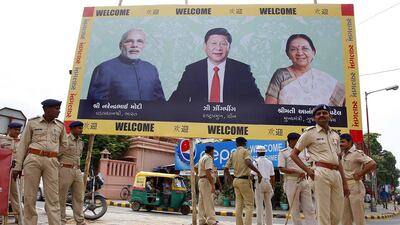NEW DELHI // Chinese president Xi Jinping begins a three-day visit to India on Wednesday, bringing with him hopes of billions of dollars in investments, even as prime minister Narendra Modi continues to woo his Asian neighbours.
Mr Modi returned from a trip to Japan earlier this month, where he convinced prime minister Shinzo Abe's government to pledge to invest $35 billion (Dh128bn) in India over the next five years.
In a speech during that visit, Mr Modi derided countries with an “expansionist” agenda, which many analysts interpreted as a veiled jibe at China’s geopolitical aggression. But no shadow of that remark hangs over the Chinese president’s impending arrival in India.
During Mr Xi’s trip, the two countries are expected to sign deals that will allow China to invest in India’s outdated, struggling railway infrastructure.
“India has a strong, real desire to increase its cooperation with China and other countries to perfect and develop its rail system,” Liu Jianchao, China’s assistant foreign minister, said in a media statement before Mr Xi’s trip. “India is considering building high-speed railways, and China has a positive attitude towards this.”
Breaking with tradition, Mr Xi will start his India visit not in the capital New Delhi but in Ahmedabad, in Mr Modi’s home state of Gujarat. On Wednesday evening, the Chinese president will be the guest of honour at a birthday banquet for Mr Modi, who turns 64.
After the banquet, Mr Jinping will leave for Delhi, where he will remain until Friday, for meetings with other Indian leaders.
The talks between the two leaders mark the first India-China summit since Mr Modi became prime minister in May. Mr Xi is accompanied by a clutch of delegates representing Chinese business and industrial interests.
China was an active investor in Gujarat during Mr Modi’s brief chief ministership of that state, which lasted from 2001 until his elevation to prime minister this year. Mr Modi courted foreign investment and promised a vibrant climate for business even then.
Last year, China’s overseas investment touched $90bn; in contrast, between 2000 and 2014, only $400m of China’s foreign investments were made in India. Similarly, although bilateral trade between the two nations stands at $65bn as of last year, India’s deficit in this relationship is a worrying $31bn. Although China dominates most trade relationships, this imbalance strikes analysts as particularly lopsided.
“The core of the problem is these bilateral imbalances,” said SK Mohanty, an economist who works for a research institute called Research and Informations Systems for Developing Countries, which functions under India’s ministry of external affairs. “It’s true that Indian products are often not competitive in Chinese markets. But China also practices protectionism.
“Until these trade imbalances are corrected, we cannot go forward,” Mr Mohanty said.
Media reports quoting Chinese officials have indicated that Mr Xi may pledge anywhere between $100bn and $300bn in long-term investments on his trip to India.
“We hope that during this visit the Chinese and Indian relationship of the last 50-60 years would see a directional change,” Nirmala Sitharaman, India’s minister for trade, told reporters last week.
Along with a deal that sees Beijing invest in India’s railway, Mr Xi’s delegation is expected to sign an agreement that will permit China to set up two new industrial parks – one in Gujarat and one in neighbouring Maharashtra. These parks will host power-generation facilities and manufacturing units, generating jobs for the local popualtion as well.
A healthy state of economic cooperation may also help settle nerves on either side of the contested stretches of border between India and China.
India has protested recent incursions of Chinese troops onto its soil.
The Indian government reported to its parliament last month that it had registered 334 Chinese incidents of border infringement this year alone. China has always denied pushing into Indian territory.
“Sure, there are unresolved issues including the boundary question,” Syed Akbaruddin, the spokesperson for India’s ministry of external affairs, said in response to a question at a media briefing on Monday.
“Yes, it will be discussed.”
ssubramanian@thenational.ae

